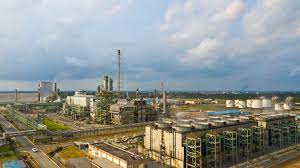By Maduabuchi Efegadi
- As RVSG goes hard against soot emitters
Indorama, the Nigerian industrial group from Eleme, near Port Harcourt, owner of the only 3.06 metric tonnes per annum (mtpa) petrochemical plant (IEPL) in Nigeria and a 3.0 mtpa fertilizer plant (IEFCL), said its efficient production system emits black soot.
The company, whose Nigerian investment increase will reach $6.4 billion by 2025, said this clearly goes against recent claims from some quarters trying to link it (Indorama) to the issuance of black soot and environmental pollution in the metropolis of Port Harcourt, a threat that has caused untold health problems. challenges in the oil city.
For Petrochemical Plants and Fertilizer Plants (IEPL/IEFCL), the company claims that the link with soot is completely false and baseless.
There is an ongoing war being waged by the Rivers State government against black soot emitters and a crackdown on artisanal crude oil refiners commonly referred to as “kpo-fire”.
To prove its guilt and expose its 24/7 precision-engineered manufacturing facilities, Indorama took media men to inspect its factories located on the Eleme Industrial Corridor, which is home to several companies. multi-billion dollar industries. Some of the industries on the corridor include: the 210,000 bpd Port Harcourt Refining Company (PHRC), currently being repaired at a cost of $1.5 billion; Notore Chemicals Ltd; Onne Oil and Gas Free Zone (OGFZ); several oil and gas service companies, among many others.
According to Jossy Nkwocha, corporate communications manager, their company operates a soot-free manufacturing process system that is closely monitored daily in a state-of-the-art digital control room.
“Indorama (Nigeria) does not emit soot; nor does it waste its gases by burning. We operate a closed system; and this closed system does not allow any foreign gases to escape. Officially, no one has accused us of emitting soot, but some people make insinuations here and there; and we have a responsibility to explain to the public to dispel such insinuations so that the public is not misinformed in any way,” Nkwocha reiterated.
He said Nigeria was importing fertilizers worth about N7 billion a year but today the country is almost a net exporter of the product, with the fertilizers coming from Indorama and other companies producing the product.
Dangote’s 3 mtpa fertilizer plant in Lagos is adding to the country’s production capacity. Indorama holds around 95% of the fertilizer market in the country.
At the company’s premises, journalists saw that the petrochemical and fertilizer plants operate 24 hours a day, 7 days a week, with respect for the environment which not only ensures the protection of the atmosphere , but also guarantees the safety of workers. and host communities.
Upon inspection, none of the fertilizer and petrochemical stacks emitted soot.
“We maintain a four percent oxygen system, which is well above the two percent needed for complete combustion during the production process, as recommended by the Federal Government of Nigeria,” a tour guide explained. engineer.
He said that was the secret behind their zero soot show.
He said it’s the incomplete combustion (carried out mostly by the state’s artisanal refiners) that results in the black soot, which is also a waste of essential resources.
In addition, Indorama Nigeria purchases its natural gas resources from Agip Nigeria Ltd (NAOC) or TotalEnergies Nigeria Ltd. Having an adequate gas supply for multi-billion dollar plants prevents waste and ensures complete combustion during the conversion process.
At the level of petrochemical production, the presence of natural gas during combustion converts the resource into polyolefins and other products highly sought after in the plastics industry.
To date, Indorama Nigeria is the largest producer of polyolefins in West Africa and the second in sub-Saharan Africa. The company employs around 7,000 people and to this day remains the main supplier of fertilizer to around 32 million Nigerian farmers, making it a major contributor to the country’s economy.
“We also supply urea to blending plants. These blending plants, each employing between 50 and 100 people. Indorama helps create jobs,” Nkwocha said.
However, Nigeria has yet to scratch its global petrochemical advantage. The country has a petrochemical capacity of more than $20 billion, with just one plant, which represents less than 10% of its petrochemical potential.
The African economic giant loses more than $10 billion a year due to its inability to develop its petrochemical sector.
Nigeria’s peers in this regard: the United Arab Emirates, Qatar, Iran and others are attracting over $90 billion in petrochemical investment. All these countries have several petrochemical plants in their areas.






More Stories
rice production process in east China’s Jiangxi – Xinhua English.news.cn
Michelin describes ‘transformational changes’ to tire factory operations
Cellforce finalizes the electrode coating production process